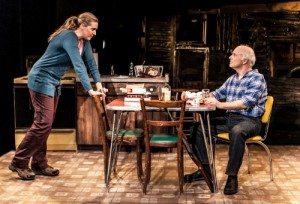On the surface, Lucy Thurber's new drama
The Insurgents, now at the Labyrinth Theater Company, recalls her previous work. Like last year's Obie-winning five-play cycle
The Hill Town Plays, which chronicled the turbulent life of an author who (like the playwright herself) escaped an upbringing of poverty and strife in a small northeast town,
The Insurgents is about a young woman---injured college athlete Sally (Cassie Beck)---struggling to break her ties to where she was born. But though Beck enters brandishing a large rifle and righteous anger, she immediately breaks character and the fourth wall to let the audience know that everything's going to be alright. She even says the evening will end with a sing-along of Creedence Clearwater Revival's "Long As I Can See the Light."
There's an optimism here that feels novel for Thurber, despite the play exploring some of the most incendiary issues of our time, including race relations, immigration, and income inequality.
"Sally doesn't kill everybody or herself, that's true," Thurber laughs when asked if her outlook is indeed a bit rosier than in the past. "Maybe I'm becoming Pollyanna in my middle age. I feel like the irony for me is that I am a very deeply patriotic person. The mark of patriotism is loving your country enough to talk about what's wrong with it in the hopes you can make it better. No one in our country at this point really knows what to do about these problems, but maybe there's a chance for us to be better versions of ourselves."
Also new for Thurber is her use of historical figures. As Sally tries to reconcile her white working class family's racist and xenophobic rants with her more progressive but still disgruntled worldview, she's visited and lectured by the spirits of four American-grown revolutionaries: abolitionist John Brown, slave rebellion leader Nat Turner, Underground Railroad bigwig Harriet Tubman, and Oklahoma City bomber Timothy McVeigh.
"I wanted to look at what causes violent insurrection," Thurber says. "People have different ideas of who's a hero and who's a terrorist. We gained our country by terrorism, even though we romanticize it as standing up against injustice. McVeigh got in there because he's more modern and addresses the frustrations of today. He was actually a highly decorated war hero from a rural working class environment. I could see Sally possibly becoming him, so I wanted to give her options. If you read what McVeigh said about economics and America, it's really amazing how much of it the average person would agree with if they didn't know he was the one who said it. I found that interesting and frightening."
Another aspect of our collective history Thurber found terrifying was how recent and, worse, celebrated public lynching was post-slavery during the Jim Crow Era. "
Postcards were made of lynched black men and sent off to family and friends," Thurber says with astonishment. "It was just so accepted. I was horrified by that and profoundly confused and affected by how disconnected we are as a culture from our own history. This happened in our parents' and grandparents' lifetimes. It's so recent and brutal."
A previous incarnation of
The Insurgents debuted at the 2011
Contemporary American Theatre Festival at West Virginia's Shepherd University. Since then, many of its themes have reached a fever pitch in our culture due to police shootings of unarmed black men and frequent financial scandals. But to Thurber, these aren't new happenings. They're part of the same old story. "While researching for the play, I got really freaked out about how repetitive we are as a country," she says. "Even the housing crisis in 2008, basically the exact same thing happened [during the Panic of 1873] around bank lending when the country was having an affluent time. The same conversations with the abolitionists are happening now about black men. It's upsetting to me and hopefully to others, too, but it's also why the play's end is optimistic. I just can't bear the idea that this is who we are forever."
The emotional and political power of music is evoked throughout the play, from Billie Holiday's anti-lynching anthem "Strange Fruit" to a darkly comic anecdote about an African-American band covering Lynyrd Skynyrd's controversial hit "Sweet Home Alabama" at an all-white wedding. So there's something cathartic and uplifting about that closing sing-along, when the audience is finally allowed to join in. "I always knew that I wanted everyone to sing at the end," Thurber says. "Maybe it goes to my idea of theatre being my church. I wanted us to come together in those final moments."
---
Raven Snook is TDF's associate editor of online content
Photos by Monique Carboni
